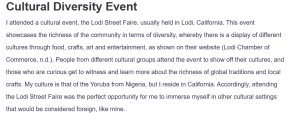Cultural Diversity Event
I attended a cultural event, the Lodi Street Faire, usually held in Lodi, California. This event showcases the richness of the community in terms of diversity, whereby there is a display of different cultures through food, crafts, art and entertainment, as shown on their website (Lodi Chamber of Commerce, n.d.). People from different cultural groups attend the event to show off their cultures, and those who are curious get to witness and learn more about the richness of global traditions and local crafts. My culture is that of the Yoruba from Nigeria, but I reside in California. Accordingly, attending the Lodi Street Faire was the perfect opportunity for me to immerse myself in other cultural settings that would be considered foreign, like mine.
Reflection on Experience
As expected, the event was exciting and enjoyable, and I learned a lot. There was an extensive display of cultural expressions through numerous items like pots, paintings, clothes, wreaths, vases, and many other handcrafted objects that serve purposes like holding plants. The event has an open-air market type of arrangement, where people set up their booths according to their liking, whether arranging them under a tent, on the ground, or on a table. Each booth was unique, and the materials were different. For instance, one booth had pots and vases made of clay and decorated, while another had welcome wreaths made of feathers, which is a testament to the unique story about the vendors’ heritage, personal identities, or creative endeavors.
Most importantly, I noticed that all these different cultural backgrounds blended into a cohesive event where people could learn, share, and celebrate. Lastly, even though I did not see direct representations of Yoruba culture in the vent, it still enabled me to connect with different aspects of other cultures and compare them to my own. As such, at the next Lodi Street Faire, I could prepare myself and get a booth to display my culture.
Engagement in the Cultural Community/Population
As Marsiglia et al. (2021) state, a social worker must approach a different culture as if it were a learning tool and adopt the role of a researcher like I did. One aspect of the event that I liked was the welcoming and engaging nature of the vendors. They were open to questions and provided as much detail as possible to the questions asked. Consequently, I realized that storytelling is a significant aspect of preserving cultural traditions and identity. For example, a Kenyan lady had a round handcrafted bag made from sisal threads with different colors from the bottom to the top. She explained that the bag is called a “kiondo” and explained its significance in her culture, noting that it is made by a mother soon after she gives birth to a girl, and each color represents a different growth stage for the girl. The mother then gives the kiondo to her daughter on the day the daughter gets married so that she can use it in her new stage of life. I had several of these experiences, which I found interesting.
Standards of Cultural Competence in Relation to the NASW Code of Ethics
The NASW Code of Ethics highlights the significance of gaining cultural competence in social work practice (Allen-Meares, 2013). Only through this can one understand and respect other cultures and be aware of how one’s own culture affects one’s thoughts and biases. This event allowed me to practice my cultural competence and recognize how much my culture affects how I perceive other cultures. By following this code of ethics, I became more open-minded and had an approach of humility and curiosity as opposed to superiority.
Differences in My Culture
The main difference between this event and my own culture is that there is a lot of exclusivity in events performed by my culture, while this one was all-inclusive. Secondly, most Yoruba festivals are like rituals with strict routines, specific clothing, songs and other aspects, which are symbolic of the cultural beliefs. The Lodi Street Faire, on the other hand, is more secular and commercial, focused on promoting cultural understanding through art, food, and crafts rather than ritual or religious observance. My comfort level during this event was high, as I was excited to have this experience from the beginning, and as I went along and engaged with more people, I only appreciated it more. Thus, I learned the importance of these events in one’s personal and professional growth. Living in a multicultural world, having open events where people learn about each other is crucial since it creates mutual understanding, bringing everyone closer. Cultural barriers are some of the significant hindrances in connecting, and events like the Lodi Street Faire are a suitable approach to bridging such gaps.
References
Allen-Meares, P. (2013). Cultural competence: An ethical requirement. In Culturally Diverse Populations: Reflections from Pioneers in Education and Research (pp. 82-91). Routledge.
Lodi Chamber of Commerce. (n.d.). Lodi Street Faire. Lodi Chamber of Commerce. https://www.lodichamber.com/lodi-street-faire/
Marsiglia, F. F., Kulis, S. S., & Lechuga-Peña, S. (2021). Diversity, oppression, and change: Culturally grounded social work (3rd ed.). Oxford University Press.
ORDER A PLAGIARISM-FREE PAPER HERE
We’ll write everything from scratch
Question
Textbook:

Cultural Diversity Event
Students will submit a 2-3 page reflection paper describing the event and your experience from the event in understanding this community, group or organization.The paper should include:
- *Name of event, type of event, location
- *Share your reflection on your experience
- *Share your engagement in the cultural community/population
- *Address standards of cultural competence in relationship to NASW Code of Ethics
- *Address how this is different from your own culture
- *Address your comfort level
- *Address what you have learned from this experience to promote your personal and professional growth.

